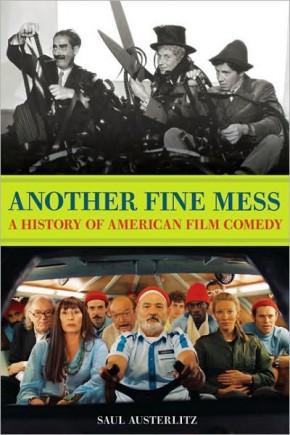From Film Comment (November-December 2010). — J.R.

Another Fine Mess: A History of American Film Comedy
By Saul Austerlitz Chicago Review Press, $24.95
As an audacious and ambitious canonizing gesture, this highly readable critical volume comes closer to Sarris’s The American Cinema than it does to Thomson’s Biographical Dictionary of Film, if only because the author can always be counted on to have seen the work he writes about. Omissions are of course inevitable, and even though I don’t know Austerlitz’s age, I suspect that most of the lacunae I notice in the creative figures he selects for his 30 chapters and 105 shorter entries — such as Fred Allen, Danny Kaye, Martha Raye, and Red Skelton — are generationally determined for both of us; older and younger readers will come up with other missing names. But the amount that he actually covers is impressive.
Sometimes the organizational strategies get weird: the chapter on Dustin Hoffman, delving perceptively into the Jewish aspects of his persona, also manages to be a chapter about Warren Beatty. Some of the research is sloppy: Orson Welles couldn’t have “credited” The Power and the Glory as an “inspiration” if he maintained that he’d never seen it. Austerlitz doesn’t convince me that Jerry Lewis’s Buddy Love in The Nutty Professor is a caricature of Dean Martin, even after conceding that the character is also an autocritique, but the charting of Lewis’s directorial career as one of decline is worth considering whether or not one agrees. The same goes for the downhill path traced in Albert Brooks (one of the liveliest chapters).
The author seems most fallible when it comes to satire — preferring Wag the Dog to Bulworth, underrating George Axelrod (whose Lord Love a Duck goes unmentioned), short-changing Frank Tashlin (whom he mislabels a cynic), and omitting Joe Dante entirely. There’s also no entry on Richard Lester; but in the Peter Sellers chapter, A Hard Day’s Night is pointedly called a feature-length remake of The Running Jumping & Standing Still Film.
